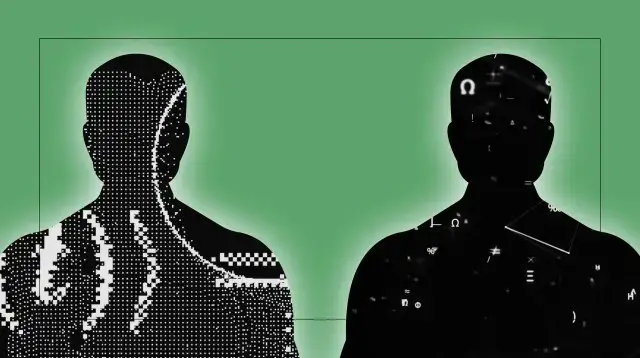Algorithms dictate a lot more than your social media feeds. Here’s how to win back your agency.
Show More Show Less View Video Transcript
0:00
Literacy of the 21st century is more than just reading and writing
0:09
It really is understanding information and understanding data. If you've ever felt like your phone is listening to you, often it is
0:19
You may talk about green rugs, and then all of a sudden you pull up Facebook or Instagram
0:23
and you scroll down, and it's like, whoa, here's an advertisement for a green rug. That data is being transferred real time and then turned into a commercial or an ad for you
0:34
With the rise of AI, it's easy to use that for corruption
0:40
And so as a society, when we help move everyone towards statistical literacy and data literacy
0:46
it forces us to be very objective in our ysis, to take in all different viewpoints and different pieces of information
0:54
and it empowers everyone. because we can all make our own informed, rational choice
1:02
instead of depending on the belief of someone else or trusting the belief of someone else
1:08
because we don't understand the information that's right in front of us
1:12
My name is Dr. Talithia Williams, and I am a math professor and a science communicator
1:16
So every day we're doing math and working with numbers just to live in society And so really all of us are statisticians and data scientists and mathematicians If I want to get a ride to the airport and I do Uber or Lyft
1:40
I'm looking at it and I'm interacting and it's telling me a distance and a time and a price
1:45
Or exercise data, right? You know, the number of steps that you took per day
1:50
or, you know, what was the range of your heart rate today? How much movement did you have
1:55
All of these things can not only help us make decisions but can help our doctor understand when things are going wrong in our system or things are working right
2:03
There are so many ways that math and statistics show up in the beauty of nature
2:11
The Fibonacci sequence is a wonderful example of how it shows up in the pattern of leaves on a plant
2:18
or things like fractals. Fractals are seen in the human body with the way that blood vessels sort of grow and move around and expand
2:26
So many of these mathematical concepts that we study and understand have direct occurrences in the world around us in ways that are just beautiful and awe-inspiring
2:39
And so part of my excitement is to make those connections and help people see that if they walk outside, there's mathematics right in front of them that they can be really excited about
2:48
What's really critical to understand when you yze data is first, what does it have the power to tell you and what does it not have the power to tell you
2:59
People think a statistical model is the end be And it not If I wanted to paint a narrative or tell a story that was not true I could very easily do that
3:12
And many people would not know, especially if it feeds an underlying belief, right
3:17
Then people will take that story, whether it's true or not, and latch onto it
3:21
And so it's almost like being a detective, right? When you give me a set of data
3:25
it's my job to uncover what's hidden in it. The first thing I'm looking for is
3:31
where was the data collected? Is it a reputable source? Is it accurate
3:36
The other thing that I'm often looking for is understanding that correlation does not imply causations
3:41
For example, if you mapped the ability to tie shoes relative to age, right, you would see that
3:47
you tie them much more effectively when you go from zero to 10 years old
3:51
But it's not just because your age is increasing, right? It's because you're becoming nimble with your hands
3:57
and now you can reach down and tie your shoes. And so I have to be careful that once I uncover those relationships
4:02
I understand the true sort of root cause of them. Then I want to know, do I have a representative sample
4:09
Often data that we collect is data that has come from society in some way
4:14
And so the same biases that we might possess ends up in the data set
4:18
We call that confounding variables. And so as a statistician, if there's a bias in the data
4:23
it's my job to find it, uncover it, pull it out, and get rid of it
4:28
There was a healthcare algorithm that was developed so that if you were to show up and present with symptoms
4:34
it would use this historical data to predict what your treatment should be And it was pretty accurate It was very good It didn take into account patient race which made the statisticians believe that it was a very unbiased model
4:46
Once the model was in practice, they found that it was biased because built into the data
4:52
was some underlying racist practices in terms of how black and brown patients showed up and would
4:59
often get assigned to lesser treatments. The model actually perpetuated that bias. And so if we don't
5:05
uncover those biases, those confounding variables, the correlations that don't imply causations
5:11
beforehand, we end up implementing it in a model, putting it into a real-life situation
5:17
but that affects people or outcomes or decisions. And those decisions then have consequences
5:24
When you have a sort of a data-literate component of society moving in the direction of AI and
5:32
machine learning and folks in society who could care less about it, who are more maybe just
5:37
consumers. We end up with people making decisions for us that we don't understand or we've had very
5:44
little influence on because so many of our daily decisions depend on numbers and math and data
5:54
It's important that as society, we are data literate. We're statistically literate so that
5:59
we are not only aware of the decisions that are being made on our behalf, but we're a part of them



